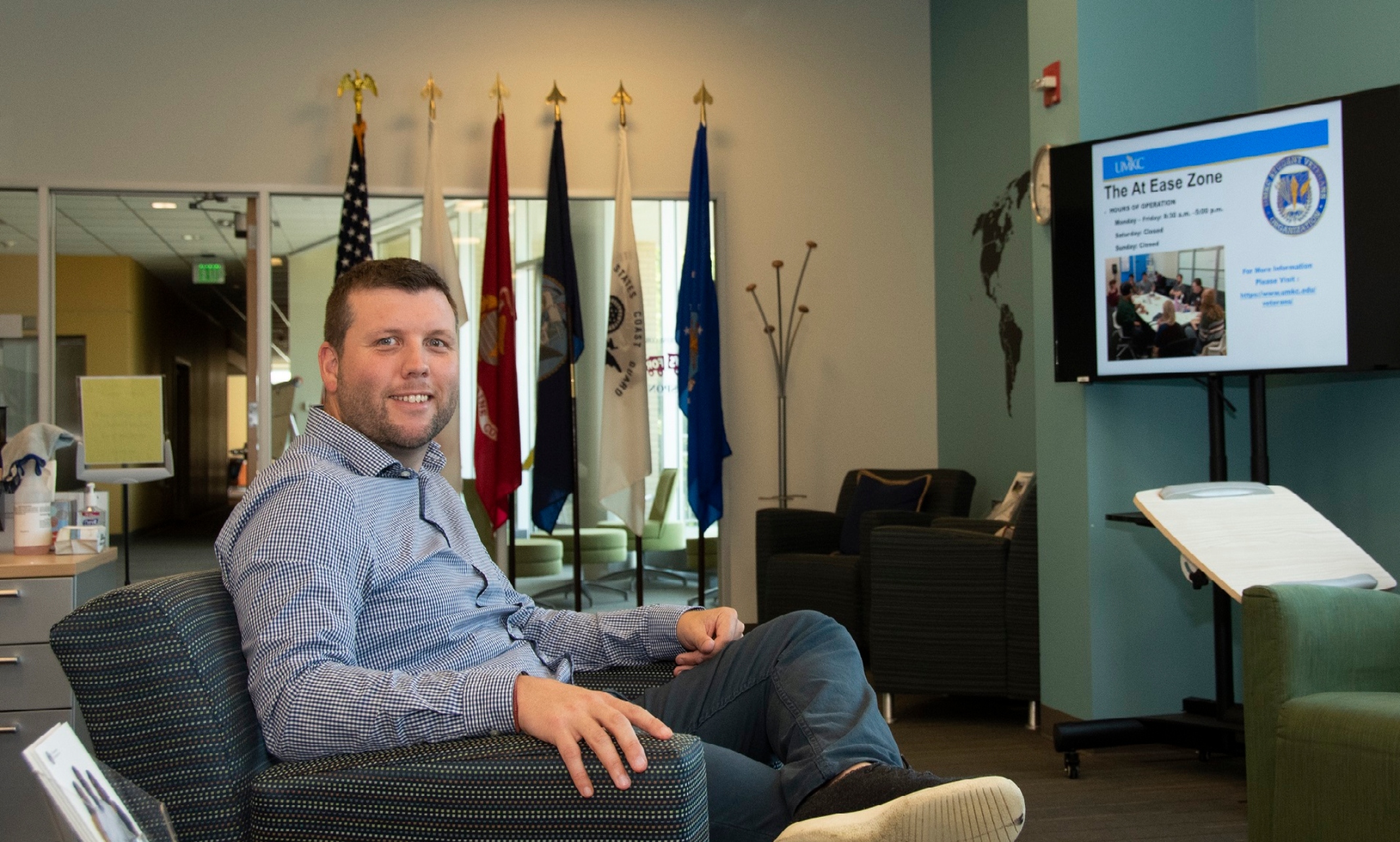Eric Gormly, assistant director for Student Veteran Support Services at UMKC, oversees the At Ease Zone, a resource center for veterans on campus. His background gives him keen insight into student veterans’ needs.
While in the U.S. Marine Corps, Gormly was deployed to Hurricane Katrina, Iraq and Peru. When he completed his service, Gormly, a Kansas City native, took advantage of his G.I. Bill and enrolled in community college to pursue a degree in law enforcement and worked in the Veterans’ Affairs office.

“After a couple of semesters my academic advisor said, ‘You talk a lot about helping vets. Are you sure you want to go into law enforcement?’”
He realized that helping veterans was his calling. Gormly has spent 10 years working in higher education establishing programs to make the transition to college easier for veterans, and to help them feel a part of campus life.
“Veterans go from a highly organized structure in the military to no structure at the university. We help with the transition.” —
“There is culture shock on re-entry,” Gormly says. “Veterans go from a highly organized structure in the military to no structure at the university. We help with the transition.”
In order to be better informed of veteran enrollment, there is an opportunity for applicants to identify veteran status on the UMKC admission application. Gormly’s office uses that to contact and connect with students who might benefit from services his office provides. While that form provides some basic information about veterans on campus, Gormly recognizes that all veterans do not have the same needs.

“We know who receives benefits, but there’s a wide range of student veterans,” Gormly says. “Also, the military doesn’t do a great job explaining the benefits, and some veterans may not be clear on how to use them.”
The At Ease Zone can be a great place for veterans to find resources. Located in Student Union, the At Ease Zone also provides a comfortable spot on campus for military-affiliated students to study, socialize and connect with staff and each other.
There are 156 new veteran students at UMKC this semester.
“I call every incoming student,” Gormly says. “We push that out. They don’t have to ask. They may need help to connect on campus. For some students, groups are better, for others one-on-one meetings work best. We try to find the best fit.”
Regardless of their preferences, Gormly notes that having a visible location on campus has made a significant difference in the way they can provide services with a variety of resources beyond being a place to relax and do homework.
“There are computers available, and students are welcome to come in to study or do Zoom classes. We have tutors, academic coaches and a 32-inch display with resources including veterans’ organizations on campus and information on the Kangaroo Pantry.”

He says with students back on campus this semester, they have been able to do more events, including volunteering.
“There are many opportunities for student veterans to get involved. Every home Chiefs football game, 20 student veterans volunteer with the Chiefs organization for pre-game activities.”
Building these connections is critical to student veterans’ success. Kavitha Reddy, BLA ’99, MD ’00, is associate director of Employee Whole Health in the Veterans’ Health Administration Office of Patient-Centered Care and Cultural Transformation and assistant professor in Emergency Medicine at the Washington University School of Medicine. Throughout her career, she has been an advocate for veterans’ health through a variety of resources in and outside the hospital setting.
“Places like the At Ease Zone are perfect places for veterans to be proactive about their health and well-being,” Reddy says. “For the men and women who went into the service relatively young – often 18 years old – they are facing a lot of new challenges along with mental and physical health issues. Civilian life may seem fragmented, and taking care of themselves, mind, body and spirit, is incredibly important
“The university establishing a safe space that is visible on campus is significant.”

Gormly is excited about the opportunities ahead.
“Vets face a lot,” he says. “They are often confronted with the idea that veterans have trouble adapting, but being in the military often helps us to adapt. These students bring a different level of commitment with maturity, motivation and persistence.
Our office provides training for faculty and staff to understand a vet’s mindset. There are so many positive qualities that they bring to campus. We hope to expand.”
For more information on services or to volunteer contact Eric Gormly at gormlyea@umkc.edu or 816-235-5599.

